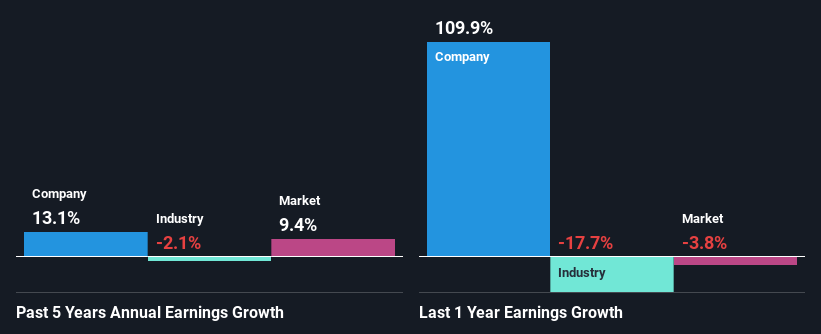Tyman plc's (LON:TYMN) Stock Is Going Strong: Have Financials A Role To Play?
Tyman's (LON:TYMN) stock is up by a considerable 46% over the past three months. We wonder if and what role the company's financials play in that price change as a company's long-term fundamentals usually dictate market outcomes. Particularly, we will be paying attention to Tyman's ROE today.
Return on Equity or ROE is a test of how effectively a company is growing its value and managing investors’ money. Simply put, it is used to assess the profitability of a company in relation to its equity capital.
View our latest analysis for Tyman
How To Calculate Return On Equity?
Return on equity can be calculated by using the formula:
Return on Equity = Net Profit (from continuing operations) ÷ Shareholders' Equity
So, based on the above formula, the ROE for Tyman is:
8.4% = UK£37m ÷ UK£443m (Based on the trailing twelve months to December 2020).
The 'return' is the profit over the last twelve months. So, this means that for every £1 of its shareholder's investments, the company generates a profit of £0.08.
What Is The Relationship Between ROE And Earnings Growth?
We have already established that ROE serves as an efficient profit-generating gauge for a company's future earnings. Based on how much of its profits the company chooses to reinvest or "retain", we are then able to evaluate a company's future ability to generate profits. Assuming everything else remains unchanged, the higher the ROE and profit retention, the higher the growth rate of a company compared to companies that don't necessarily bear these characteristics.
Tyman's Earnings Growth And 8.4% ROE
When you first look at it, Tyman's ROE doesn't look that attractive. However, the fact that the its ROE is quite higher to the industry average of 5.9% doesn't go unnoticed by us. Consequently, this likely laid the ground for the decent growth of 13% seen over the past five years by Tyman. That being said, the company does have a slightly low ROE to begin with, just that it is higher than the industry average. So there might well be other reasons for the earnings to grow. Such as- high earnings retention or the company belonging to a high growth industry.
When you consider the fact that the industry earnings have shrunk at a rate of 2.1% in the same period, the company's net income growth is pretty remarkable.
The basis for attaching value to a company is, to a great extent, tied to its earnings growth. What investors need to determine next is if the expected earnings growth, or the lack of it, is already built into the share price. This then helps them determine if the stock is placed for a bright or bleak future. One good indicator of expected earnings growth is the P/E ratio which determines the price the market is willing to pay for a stock based on its earnings prospects. So, you may want to check if Tyman is trading on a high P/E or a low P/E, relative to its industry.
Is Tyman Making Efficient Use Of Its Profits?
The high three-year median payout ratio of 71% (or a retention ratio of 29%) for Tyman suggests that the company's growth wasn't really hampered despite it returning most of its income to its shareholders.
Besides, Tyman has been paying dividends for at least ten years or more. This shows that the company is committed to sharing profits with its shareholders. Existing analyst estimates suggest that the company's future payout ratio is expected to drop to 41% over the next three years. However, the company's ROE is not expected to change by much despite the lower expected payout ratio.
Summary
Overall, we feel that Tyman certainly does have some positive factors to consider. Specifically, its respectable ROE which likely led to the considerable growth in earnings. Yet, the company is retaining a small portion of its profits. Which means that the company has been able to grow its earnings in spite of it, so that's not too bad. Having said that, the company's earnings growth is expected to slow down, as forecasted in the current analyst estimates. Are these analysts expectations based on the broad expectations for the industry, or on the company's fundamentals? Click here to be taken to our analyst's forecasts page for the company.
This article by Simply Wall St is general in nature. It does not constitute a recommendation to buy or sell any stock, and does not take account of your objectives, or your financial situation. We aim to bring you long-term focused analysis driven by fundamental data. Note that our analysis may not factor in the latest price-sensitive company announcements or qualitative material. Simply Wall St has no position in any stocks mentioned.
Have feedback on this article? Concerned about the content? Get in touch with us directly. Alternatively, email editorial-team (at) simplywallst.com.

 Yahoo Finance
Yahoo Finance 
